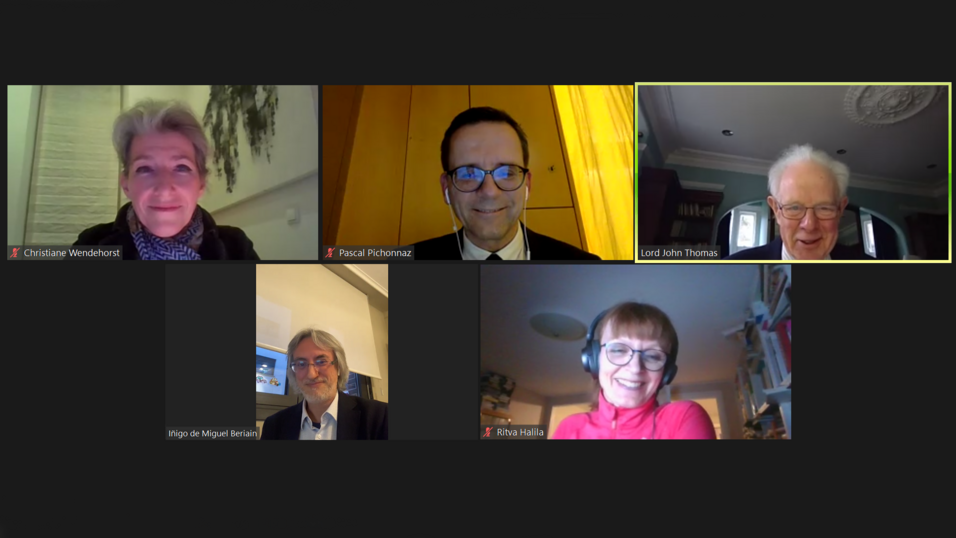The second ELI webinar in the Institute’s 2021 webinar series focused on the updating of the ‘ELI Principles for the COVID-19 Crisis’ and brought together over 100 ELI Members and Friends from Europe and beyond.
ELI First Vice-President and Chair of the webinar, Lord John Thomas, pointed out that as Europe is searching its ways for emerging from the crisis of the pandemic, it is necessary to provide further guidance to the decision makers. In particular, the proposed additional Principles provide legal guidance on how a fair and equitable emergence from crisis could look like.
Christiane Wendehorst (Professor, University of Vienna; ELI President) discussed the draft Principle 16 of the draft 2021 Supplement that revolves around the proportionality of measures. As some countries are experiencing a third wave of the COVID-19 pandemic and other have high percentages of people already vaccinated against the coronavirus, the question of when states should lift restrictions arises. The European Commission recently proposed the introduction of a Digital Green Passport, which would lift restrictions on an individual basis. Wendehorst emphasised that from a legal point of view states may no longer have a justification for keeping restrictive measures in place when some individuals pose a lower epidemiological threat, as restrictions always have to be proportional and justified. Lifting restrictions would, thus, be a return to normality and not a privilege.
Pascal Pichonnaz (Professor, University of Fribourg; ELI Second Vice-President) explained the draft Principle 17 of the draft 2021 Supplement that addresses the issue of equitable distribution of vaccines. Although vaccination strategies greatly vary from country to country, the administration of vaccines should always adhere to the principles of fairness and equality. Factors like vulnerability, risk of spreading the virus, and systematic contact with the ill and vulnerable are among those that deserve consideration when distributing vaccines. Furthermore, the registration and administration of vaccines needs to be designed in a non-discriminatory and transparent way in order to avoid abuses and the waste of vaccines.
Ritva Halila (Chair of the Committee on Bioethics (DH-BIO) of the Council of Europe; Senior Medical Officer, Ministry of Social Affairs and Health, Finland) pointed out the dichotomy of the wish to mitigate the crisis and lack of available vaccines. It would be of utmost importance to develop a procedure that is non-discriminatory in design and ensures that all eligible individuals receive vaccines without barriers. She emphasised that, in particular, the needs of vulnerable individuals, such as people suffering from mental illnesses, homelessness, or refugees, need to be taken into consideration. Lastly, clear and transparent communication and the access to reliable and easy to understand resources would play a crucial role in overcoming the pandemic.
Iñigo de Miguel Beriain (Ikerbasque Research Professor, University of the Basque Country, Participatory Approaches to a New Ethical and Legal Framework for Information and Communication Technologies (PANELFIT) Project) discussed how a passport that shows whether someone is infectious or not could be designed and emphasised that issues related to discrimination, equity, privacy, and data protection would need to be tackled. He stressed that enabling individuals to enjoy their freedom of movement again is not a privilege, but rather a return to normality. As a way to ensure privacy and data protection, he suggested a simple system of green lights and red lights signaling whether someone is infectious instead of disclosing exact reasons for the green or red light, ie whether an individual is vaccinated, tested, or recovered from the disease.
A lively discussion focusing on the adherence to the rule of law, in the context of vaccination as well as when emerging out of the pandemic, and on the right to choose particular vaccination, followed.
The webinar recording is now available below.

